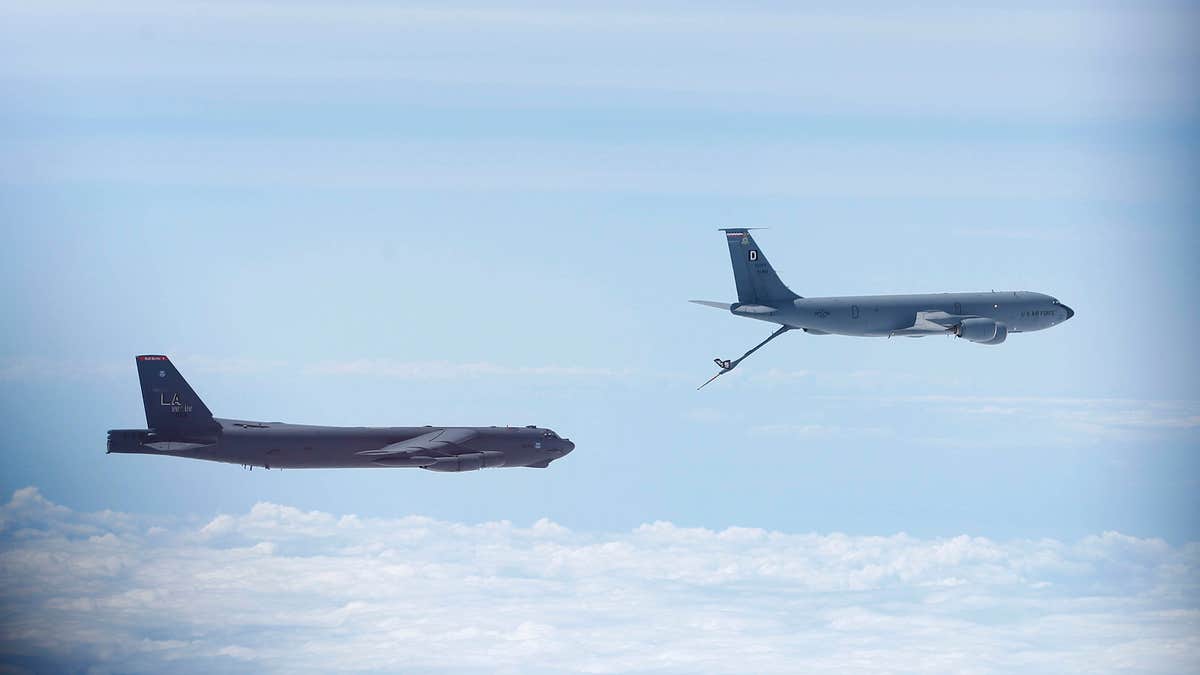
June 17, 2014: A U.S. Air Force B-52 is seen through the window of another as it prepares for a mid-air refuel during a training mission in the United Kingdom's airspace. (Reuters)
U.S. officials said Saturday its two B-52 bombers didn’t intend to fly over China’s artificial island in the South China Sea, after Beijing scolded Washington and accused them of a “serious military provocation” in the disputed waters.
China’s Defense Ministry said earlier the U.S. was deliberately raising tensions in the region, where China has been aggressively asserting its claims to most of the man-made reefs in the sea. It reiterated that it would do whatever is necessary to protect China’s sovereignty.
Mark Wright, a Pentagon spokesman, said that the Dec. 10 mission was not a “freedom of navigation” operation and there was “no intention of flying within 12 nautical miles of any feature,” including the mission may have strayed off course.
A senior U.S. defense official told The Wall Street Journal that bad weather may have contributed to the pilot flying off course and into the area where China claims.
The U.S. uses pre-planned freedom of navigation operations to assert its rights to "innocent passage" in other country's territorial waters.
"The United States routinely conducts B-52 training missions throughout the region, including over the South China Sea," Wright told the Associated Press. "These missions are designed to maintain readiness and demonstrate our commitment to fly, sail and operate anywhere allowed under international law."
China’s Defense Ministry demanded that Washington immediately take action to prevent such incidents and damage to relations between the two nations’ militaries.
The actions by the U.S. side constitute a serious military provocation and are rendering more complex and even militarizing conditions in the South China Sea," the ministry said in a statement.
The statement said that Chinese military personnel on the island went on high alert during the overflights by the B-52 strategic bombers and that they issued warnings demanding the aircraft leave the area.
Speaking to reporters on a visit to Berlin, Chinese Foreign Minister Wang Yi drew a contrast between the situation in the South China Sea region and the chaos and turmoil in other parts of the world. "The situation in the South China Sea is essentially stable overall," he said.
Wang also said that while China understands the concerns of nations from outside the region — a clear reference to the U.S. — they should "do more to benefit peace and stability and support efforts to find a resolution through talks, and not manufacture tensions or even fan the flames."
"We don't think this is a constructive approach and will not receive the support and welcome of relevant nations," Wang said.
China's latest protest comes amid a simmering dispute over Washington's approval this past week of the first arms package in four years offered to Taiwan, Beijing's self-governing rival. Beijing, which regards
In October, a U.S. Navy ship passed within 12 nautical miles of the disputed islands in the South China Sea. Chinese officials warned the guided missile destroyer USS Lassen as it moved inside the zone around the Subi Reef.
Navy officials said at the time that the sail-past was necessary to assert the U.S. position that China’s man-made islands cannot be considered sovereign territory with the right to surrounding territorial waters.
Two American B-52 bombers also flew near the artificial islands last month.
"We conduct B-52 flights in international air space in that part of the world all the time," Pentagon spokesman Peter Cook said in November. "My understanding is there was one B-52 flight, I'm not even sure the date on it, but there was an effort made by Chinese ground controllers to reach out to that aircraft and that aircraft continued its mission. Nothing changed."
Taiwan as part of its territory, demanded the deal be scrapped to avoid harming relations across the Taiwan Strait and between China and the U.S.
Beijing filed a formal diplomatic complaint and its Foreign Ministry said it would take "necessary measures, including the imposition of sanctions against companies participating in the arms sale to Taiwan."
The main contractor behind the weaponry is Raytheon. U.S. defense firms are forbidden to sell arms to China.
The Associated Press contributed to this report.




